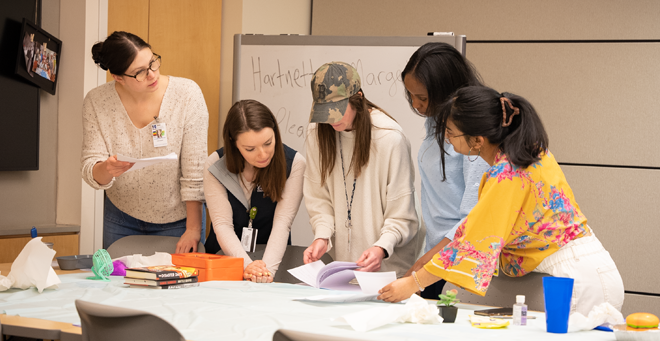
The popularity of the escape room puzzle-solving experience is finding its way into nursing education. Students at the Tan Chingfen Graduate School of Nursing at UMass Chan Medical School are already clued into the game-based learning activity.
Second-year Doctor of Nursing Practice students are participating in an educational escape room this spring, a collaborative activity that requires problem solving, decision making and mimicking efficient patient workflow to be successfully completed.

Danielle Hebert, DNP, MBA, MSN’07, ANP-BC, assistant professor of nursing and coordinator of adult-gerontology primary care nurse practitioner track, piloted the educational escape room in the DNP second-year curriculum when she joined UMass Chan in 2021.
Hebert organizes escape rooms each semester for groups of six to eight DNP students. The rooms are designed to resemble a patient’s apartment, and can simulate the patient’s bedroom, bathroom, dining room or living room.
The student groups must each solve six complex clinical puzzles in one hour to complete the lesson.
“It really does replicate the pace of seeing patients and a provider schedule, where we see patients quickly and need to do things efficiently and correctly. The students are put into a scenario with several situations and questions they have to consider. They need to look for clues and it makes them consider the patient at home, and what might be the social determinants of health to consider as they’re trying to figure out what’s happening with the patient,” Dr. Hebert said.
The escape rooms are designed to help students advance their critical thinking and reasoning skills and promote teamwork and collaboration. Students are allowed to access resources while in the escape room as they would in a real health care environment.
“The escape room allows the students to become more comfortable with how to research guidelines, how to navigate resources and how to become more focused in their thinking,” Hebert said.
The puzzles are designed by Hebert and are built and organized with assistance from third-year DNP students. According to Hebert, a high percentage of the students and faculty participating in the escape rooms have said the project has had an impact on their learning.
“When we get feedback from the students, there’s usually one or two things they say they will never forget, because it’s usually a puzzle that stumped them. If they can keep that component and walk away from the escape room remembering important skills or lessons, ones they can use in environment that they end up practicing in, then I consider it to be a win,” Hebert said.
Hebert received a $5,000 Tan Chingfen Graduate School of Nursing Dean Seed Grant for Research/Scholarship last spring from Joan Vitello-Cicciu, PhD, the Donna M. and Robert J. Manning Chair of Nursing, professor of nursing and dean of the Tan Chingfen Graduate School of Nursing, to develop a framework for educational escape rooms geared toward health care professions that can be replicated at other nursing schools and professional organizations. Hebert had an article published this spring in the Journal of Professional Nursing on the implementation of educational escape rooms in doctoral nurse practitioner curriculum.


